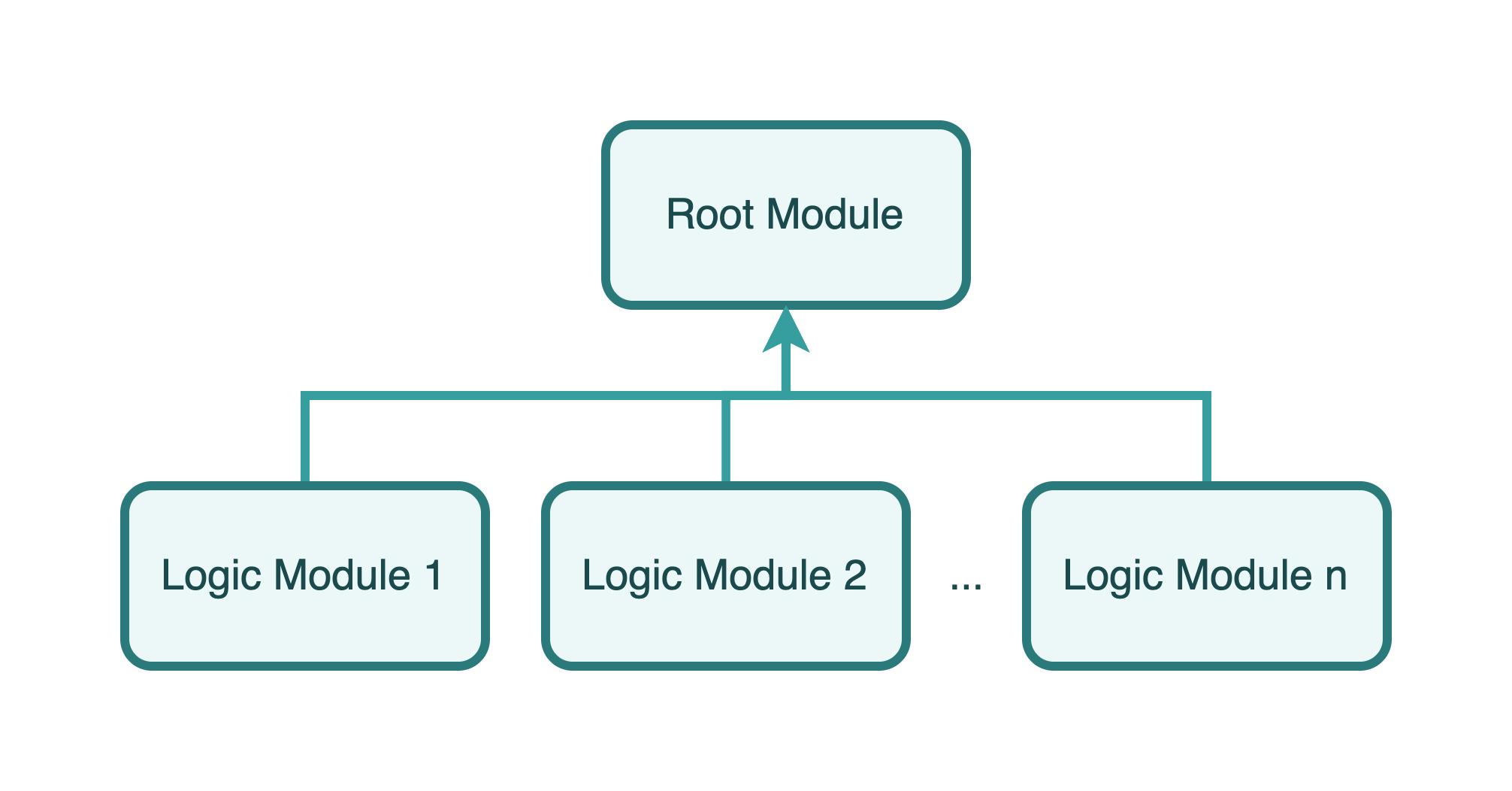Modules
A module is a class annotated with a @Module() decorator. The @Module() decorator provides metadata with providers, components, imported modules and exported providers and component, which could be made use of to organize an Agros application.

When an Agros application is to be initialized, one and only one module, called the root module, must be provided as the entry module for the application built by Agros.
Let's continue with the examples written before, now we should create a module called UserModule:
import { Module } from '@agros/app';
@Module()
export class UserModule {}
Shared Modules
Exports
In Agros, any normal module is shared module, which means it can be reused by other modules and its exported providers and components can also be accessed from other modules .Here is an example of using imports and exports to share providers between modules:
.
└── src/
└── modules/
├── user/
│ ├── user.module.ts
│ └── user.service.ts
└── profile/
├── profile.module.ts
└── profile.service.ts
user.service.ts is a provider declared in the UserModule, which is declared and exported by the UserModule:
You can find the content of UserService here.
import { Module } from '@agros/app';
import { UserService } from './user.service';
@Module({
providers: [
UserService,
],
exports: [
UserService,
],
})
export class UserModule {}
UserService must be exported from UserModule that it can be imported by other modules.
Imports
Now, the ProfileService in the ProfileModule wants to have access to the getCurrentUser method in the UserService, so the FooModule must be imported via the imports option in bar.module.ts:
import { Module } from '@agros/app';
import { ProfileService } from './profile.service';
import { UserModule } from '../user/user.module';
@Module({
imports: [
UserModule,
],
providers: [
ProfileService,
],
})
export class ProfileModule {}
Next, the ProfileService in profile.service.ts can pass the UserService as a type annotation with one parameter into the constructor:
import { Injectable } from '@agros/app';
import { UserService } from '../user/user.service';
@Injectable()
export class ProfileService {
public constructor(
private readonly userService: UserService,
) {}
public async getProfile() {
const currentUser = await this.userServuce.getCurrentUser();
return currentUser;
}
}
Notice the use of the private syntax. This shorthand allows us to both declare and initialize the userService's member immediately in the same location.
Global Modules
If you have to import the same set of modules everywhere, it can be very boring. So when you want to provide a set of providers which should be available everywhere out-of-the-box (e.g., utilities, etc.), make the module global with the @Global() decorator:
import {
Global,
Module,
} from '@agros/app';
@Global()
@Module(/* metadata */)
export class UtilsModule {}
Once the UtilsModule has been imported into the root module, any other module can access its exported providers without having to explicitly import it.
Asynchoronous Modules
Agros support importing modules as a dynamic promise by import() declaration:
import { Module } from '@agros/app';
import { AppComponent } from '@/app.component';
import { AppService } from '@/app.service';
import { AppInterceptor } from '@/app.interceptor';
import { FooModule } from '@modules/foo/foo.module';
const BazModule = import('@modules/baz/baz.module').then(({ BazModule }) => BazModule);
@Module({
providers: [
AppInterceptor,
AppService,
],
components: [AppComponent],
exports: [
AppComponent,
AppInterceptor,
AppService,
],
imports: [
FooModule,
BazModule,
],
})
export class AppModule {}
According to Webpack's behavior to import(), it will be dynamically loaded and splitted into a standalone bundle by Webpack.